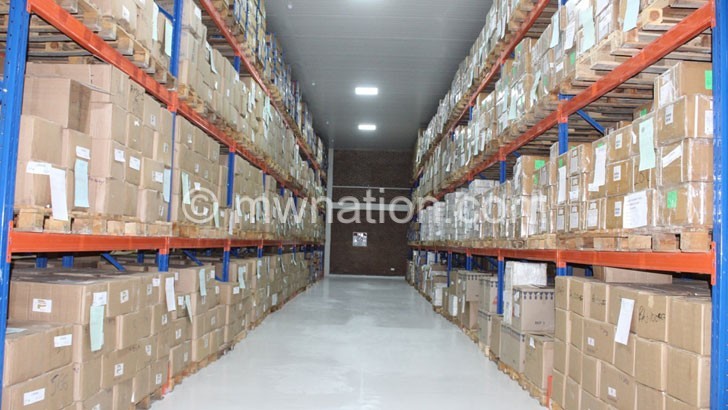Blame game on expired drugs
Malawi has in the past three years destroyed expired medicines and medical supplies valued at K10 billion amid stockouts in public hospitals. While the Central Medical Stores Trust (CMST) has attributed the situation largely to uncoordinated donations, the Ministry of Health (MoH) has described the assertion as confusing and demanded more information.
In its presentation to the Parliamentary Committee on Health in Lilongwe on Tuesday evening, CMST said the K2 billion worth of drugs that have expired this year are part of a trend that has seen drugs valued at about K10 billion expiring since 2018.

The CMST presentation indicated that in 2018/19 financial year, drugs worth about K4 billion were destroyed while in 2019/20 the figure dropped to around K3.5 billion and this year the expired drugs are worth about K2 billion.
In an interview after the meeting at Parliament and the presentation ,CMST officials maintained that uncoordinated donations where government and health facilities “accepts all manner of donations without informing CMST” contribute to the growing expiry on the shelf of medicines and medical supplies.
CMST also mentioned limited drug budgets for district health offices [DHOs], which reduces the purchasing power of health facilities, as another contributing factor.
Reads the presentation in part: “They [DHOs] begin to choose and get more of some products and less of the others against original estimates, creating an imbalance.
“Changes in treatment guidelines also render some available products obsolete.
“Ministry of Health and CMST quantification challenges and inadequate capacity in contract management [is yet another factor].”
During the interview, CMST board chairperson Josiah Mayani, who was part of the delegation, highlighted donations as a huge problem, stressing the need for MoH to inform and consult the trust before accepting some donations of medicines and medical supplies.
He said: “When donations come to CMST without us knowing, we end up in a situation whereby we already have those supplies in our stores and, therefore, if these donations are to go to district hospitals, it means these hospitals will not come to us to buy drugs which we already procured based on their demand.
“At the end of the day, the drugs that were already procured get expired. Ideally, we would prioritise what we ordered because if we do not sell, then we have no income.”
Mayani also said accepting all manner of donations leads to oversupply of the products, most of which have a shorter shelf life.
But in a telephone interview yesterday, MoH director of Health Technical Support Services Godfrey Kadewere, who also attended the meeting at Parliament, said the presentation from CMST needed more clarity.
He said CMST is also suggesting that it should coordinate all donations which is not practical as it can create conflict of interest.
Kadewere said: “What we know is that they have to procure and store products with a business sense, as such, managing donations would be departing from their [CMST] mandate. So, for things they can procure, let them do so and for those supported by programmes or indeed donations, let them be. Why should we refuse a donation when it is addressing the need?”
But Mayani and CMST chief executive officer Chikaiko Chadzunda maintained that they need to be informed about all donations to assist in logistics.
The officials also said the Buy Malawi Strategy (BMS), which compels ministries, departments and agencies to buy 60 percent local products has had a serious effect on drug expiries.
Mayani said: “The cost of products under BMS is quite huge and this reduces the purchasing power for health facilities. A product under this arrangement, sometimes, can cost double the amount and most DHOs, with low drug budgets, do not buy as much as they could, the more reason we have appealed for consideration to have this arrangement not apply to pharmaceutical products.”
Since 2012 when CMST was established, drugs worth about K20 billion have expired. The amount is K1 billion in excess of what CMST currently owes suppliers. The trust needs about K19 billion o recapitalise.
The rate of drug expiry for Malawi, according to the presentation, is above international medical stores benchmarks pegged at two percent of stock valuation per annum. In 2018/19, CMST had the benchmark at eight percent, in 2019/20 it was at 10 percent and this fiscal year it is at three percent.
In an interview yesterday, committee chairperson Mathews Ngwale said they are not satisfied with responses from both Ministry of Health and CMST. He said they asked them to rework the presentation.
He said: “We invited them to explain about the K2 billion worth of drugs that expired only to discover that more billions have been lost.
“While they blame it on donations, we need to know how much of those expired are a result of donations. How were these donations made and when? ”
Ngwale said they also want the ministry to explain its role in all this to ensure value for money.
CMST was established to store and distribute medicines and medical supplies to public health facilities. Hospitals make their orders based on their needs and in line with the country’s treatment guidelines and essential medicines list. Central hospitals manage their own drug budgets while for district hospitals, the drug budget is managed through National Local Government Finance Committee.






One Comment